Iran Army Commander Calls Protesters ‘Flies’
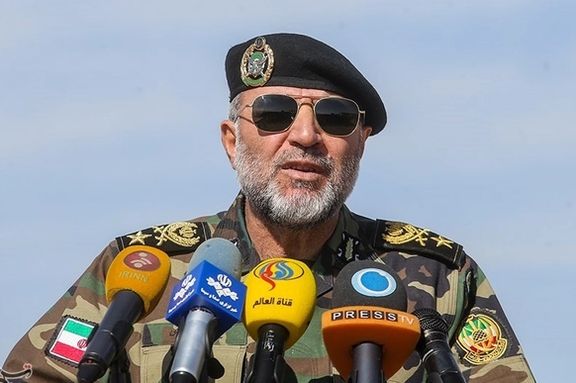
Iran’s Army Ground Forces Commander has threatened antigovernment protesters with a harsh response if the Supreme Leader Ali Khamenei orders it.

Iran’s Army Ground Forces Commander has threatened antigovernment protesters with a harsh response if the Supreme Leader Ali Khamenei orders it.
Kiumars Heydari said Wednesday that “the flies,” implying the protesters, would have no place in the Islamic Republic if Ali Khamenei ordered a tougher clampdown on nationwide protests.
“The enemies” have carried out their “attacks and hostilities” since the day the Islamic Republic was established, but they could not do anything, and now that the Islamic Republic “has become stronger, they definitely cannot do anything wrong.”
Iranian leaders accuse “enemies” including the United States of fomenting the unrest. A group of 227 parliament members in Iran called on the Judiciary Sunday to issue death sentences for people arrested during the ongoing antigovernment protests.
The hardline lawmakers urged the judiciary to “deal decisively” with the “perpetrators” and followed the same unsubstantiated argument that protesters are either foreign agents or have been “deceived” by them.
Government spokesman Ali Bahadori Jahromi also said on Tuesday, “it would have been a “piece of cake” for police forces to use live rounds on the protesters,” and people would be afraid to leave their homes. His comment elicited a lot of angry reactions on social media.
Jahromi argued that the government will not resort to such actions because youths on the streets are not enemies but “our wrongdoer children.”
One of the biggest challenges to Iran's clerical leaders since the 1979 Islamic Revolution, the seven-week-old demonstrations have persisted despite a deadly crackdown and severe warnings from security forces.
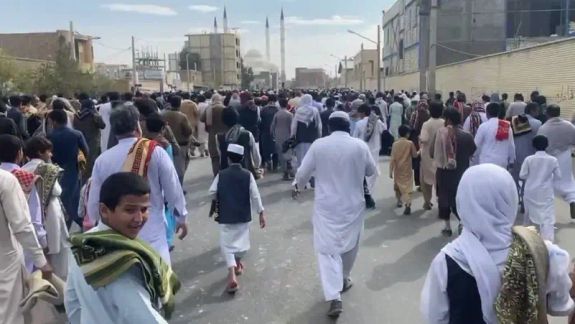
Amid nationwide calls to hold commemoration ceremonies for those killed forty days ago in Iran’s southeastern Sistan and Baluchestan province, a new police commander has been appointed in the flashpoint region.
Hossein Ashtari, Commander of Iran’s Police, in a decree on Wednesday replaced Ahmad Taheri with Mohammad Ghanbari.
These changes are taking place following four consecutive weeks of protests after Friday payers in the provincial capital Zahedan.
Taheri was the commander of police forces in the province during the massacre on September 30 in capital Zahedan also known as “Bloody Friday” in which nearly 100 people were killed.
On Thursday, the Security Council of the province, dismissed the commander of Zahedan police and chief of a police base in the city to calm the situation.
In response to these dismissals, the Sunni Imam of Zahedan, called the move “inadequate” but “a right act” demanding the formation of an independent fact-finding committee to deal with the Bloody Friday massacre.
Last Friday protests took place in the town of Khash in the province and dozens were killed and injured after security forces opened fire at demonstrators.
Meanwhile, the anonymous groups called Youth of Tehran and Tabriz neighborhoods in a statement called on citizens to stage fresh protests Wednesday afternoon to express solidarity with people in Sistan and Baluchestan.
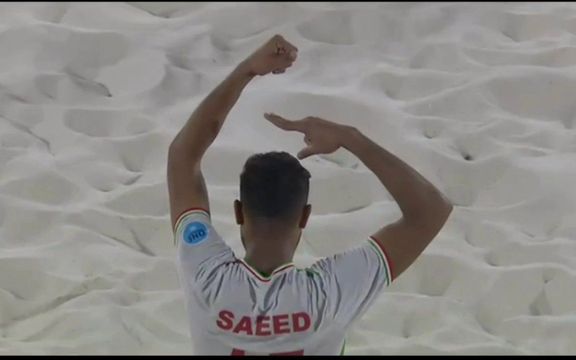
Iranian athletes are displaying their solidarity with protesters at international games despite threats of punishment, forcing the regime to decide whether to compete or not.
When he scored a goal in the final of the Intercontinental Beach Soccer Cup at Cottage Beach in the United Arab Emirates November 6, instead of the usual display of his joy Iranian player Saeed Piramoun made a gesture of cutting his hair, a symbolic act in solidarity with women protesting forced hijab in Iran. With his goal Iran won the match against Brazil 2-1 and the championship of the competitions.
The “hair-cutting” gesture has become an international symbol of solidarity with Iranian women and the protest movement with many international athletes and celebrities posting images of themselves re-enacting the move.
Authorities have made serious threats against athletes and other celebrities to stop them from public displays of solidarity with protesters but to no avail.
Many Iranians have hailed Piramoun, an ethnic Baluch from the southeastern port city of Chabahar.
“These symbolic gestures attract global attention to the protests and hit [the regime] domestically,” a tweet after the match said.
Another Twitterati opined that similar actions by sports teams and athletes may force the Islamic Republic to forsake the Qatar World Cup to avoid international disgrace. Iran will be playing its first match against England on November 21.
Without naming Piramoun in its statement Monday, Iran’s Football Federation vowed to discipline those who display their political stances in sports arenas. “Those who have not abided by professional and athletic ethics,” the statement said, would be punished according to regulations.
The federation’s exhortation against involvement in politics is in stark contradiction with its own pressure on athletes to avoid competing with Israelis in international sports competitions, even at the cost of being eliminated from the games or losing titles.
Less than a month ago Supreme Leader Ali Khamenei praised Iranian athletes who refuse to play against Israelis, and said not competing with Israeli athletes is “a victory” in itself.
Piramoun was not alone in his protest action. His teammates had unanimously refused to sing along when the Islamic Republic’s anthem was played before the semi-finals and at the awards ceremony. They stood with their arms crossed without showing any signs of celebrating their win. The state television (IRIB) hastily cut its live reporting short to prevent people from receiving the team’s message of solidarity with protests.

Authorities have tried to distort the meaning of such gestures in other instances when individual athletes and sports teams displayed less obvious gestures of solidarity with protesters than Piramoun’s, such as refusing to show any signs of celebration for scoring goals or winning games.
The state TV anchor last week claimed Esteghlal FC players’ refusal to cheer when they won this year’s Super Cup was a sign of respect for those killed in a shooting attack in Shahcheragh Shrine in Shiraz for which ISIS apparently took responsibility.
Many Iranians suspect the government of complicity with ISIS in the attack, in the least, to create its own narrative and martyrs. The Shahcheragh incident, they claim, was meant to distract attention from the opposition’s protests and those killed in them or justify harsher suppression of the protesters who, the government claims, have caused insecurity in the country.
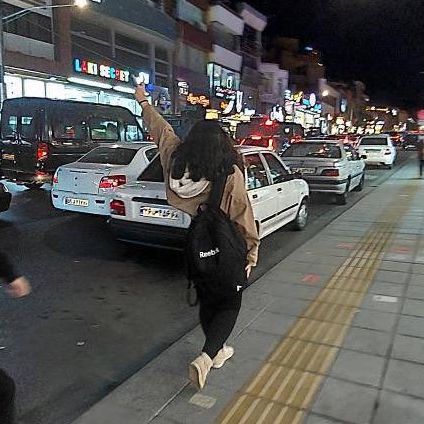
The uprising of Iranians against their clerical government continued Tuesday with protest rallies held by students and calls for nationwide demonstrations on Wednesday.
The mourning ceremony for Nasrin Ghaderi turned into a scene of protest in the western city of Marivan where residents chanted anti-regime slogans.
Ghaderi, 35, who was a philosophy doctoral candidate in Tehran died on Saturday after being beaten by security forces with baton during Friday’s protests.
A video received by Iran International shows a girl cutting her hair at the grave of this young woman, as a symbolic act against forced hijab.
Iran's official news agency IRNA has dismissed media reports that Ghaderi was killed with baton strikes, saying she was "living her normal life" when her family suddenly lost touch with her, and once their son-in-law broke into her residence in Tehran, they found her dead.
In the meantime, several calls for protest have been issued for Wednesday in Zahedan and other cities on the occasion of the 40th day after “Bloody Friday of Zahedan”.
The Bloody Friday in Zahedan, the provincial capital of Sistan and Baluchestan took place September 30, when security forces killed at least 93 people, and injured hundreds more. Zahedan is one of the few Sunni-majority cities in predominantly Shiite Iran.
Videos received by Iran International also show students in various Iranian universities, including Beheshti, Sharif, Kordestan Medical Sciences and Babol Noshirvani staged sit-ins on Tuesday.
Amid high inflation and an economic crisis, a group of retired teachers and civil servants gathered in front of the Planning and Budget Organization in Tehran to demand their unpaid pensions and benefits.
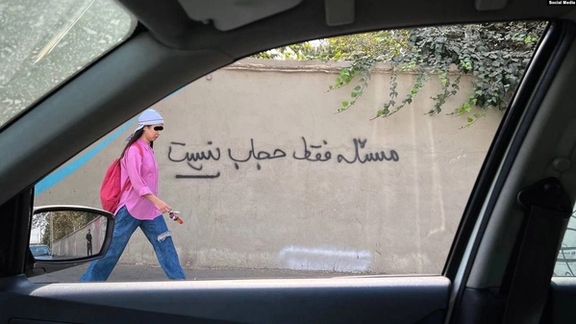
Another video shows a protester setting fire to a Qassem Soleimani banner. Soleimani, commander of the Revolutionary Guards (IRGC) extra-territorial Quds Force, was killed in Baghdad along with nine others in 2020 by a drone strike ordered by then-President Donald Trump.
The Islamic Republic and its supporters have portrayed Soleimani as a beloved hero, but protesters who want to topple the regime regard him as a war criminal who was responsible for killing both Iranians and others, such as Syrians during that country’s civil war.
Since September, people have destroyed Soleimani’s statues and pictures including in his hometown to show anger at regime’s propaganda.
A hardliner member of the Islamic Republic parliament called the move an “anarchic hate crime” that is becoming a public issue, he said.
Ali Asghar Annabestani said Tuesday that “the enemy has very cleverly turned people's protests into an anarchist riot, and protesters break all the boundaries that can be sacred for human society.”
“The people and government do not tolerate doing this to a national hero, so the security organizations must step in and prevent such acts. Destroyers should be identified and punished and then introduced to all people,” added the MP.
In another development, Zahra Rahnavard, the wife of dissident figure Mirhossein Mousavi, in a message demanded the release of imprisoned students and an end to threats, suspensions and expulsions of schoolchildren. Stating that “protest is the nation's right,” she added “Respect the youth, don't kill the nation's children and listen to the nation's voice.”
Zahra Rahnavard’s husband Mirhossein Mousavi, who has been under house arrest since February 2011, was Iran’s Prime Minister from 1981 to 1989. He was a candidate in the disputed presidential election in 2009 and challenged the results leading large protests for months before he was arrested and put under house arrest without a trial. His wife Zahra Rahnavard and another candidate Mehdi Karroubi suffered a similar fate as all three were accused of “sedition” against the regime.
Reports say after darkness fell on Tuesday, people in Tehran began chanting slogans on rooftops and at their windows, while people in the flashpoint Kurdish city of Sanandaj in the west took to the streets lighting fires and chanting antigovernment slogans.
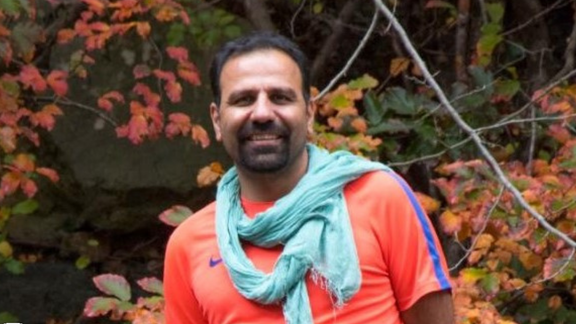
Iran’s security forces have arrested at least 13 Iranian lawyers who are still in custody since the beginning of 2022 protests in September.
The latest attorney authorities detained is Mostafa Nili, who represented many civil and political activists as well as several protesters. He was arrested Monday by the IRGC Intelligence Organization (SAS).
His sister, Fatemeh Nili wrote in a tweet that the Iranian solicitor has been arrested in Tehran’s Mehrabad Airport on Monday.
Mostafa Nili is one of the human rights defenders in Iran who has been detained several times. He was released on December 27 last year after four months and four days in detention.
His arrest last year came after he and four other attorneys and civil activists started efforts to file a complaint against the authorities of the Islamic Republic for their mismanagement during the COVID pandemic, but intelligence arrested all of them before they could file the complaint.
Last week, forty Iranian lawyers issued a statement saying most people no longer want the Islamic Republic and called on their peers to speak up and defend the people.
In their statement about the ongoing protests, the attorneys said that confronting “the illegitimate power [of the government] and its decisions and laws” is the right of the people adding that “at the moment our concern is freedom and judicial justice.”
In the past years, Iran's judiciary and security agencies imprisoned many human rights defenders and lawyers, including Abdul Fattah Soltani and Nasrin Sotoudeh.
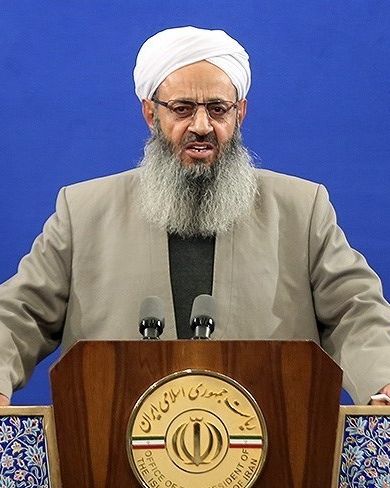
The outspoken Sunni Imam of Zahedan says women, ethnic and religious groups, and minorities have faced discrimination after the establishment of the Islamic Republic in 1979.
In a meeting with female students from Sistan and Baluchestan Province, Molavi Abdolhamid said “Without women, we cannot build the country and society.”
Referring to the popular uprising in the last 50 days, he said this movement was staged by “women” and is the result of their dissatisfaction with “discrimination and inequality and the harsh behavior of the government.”
“If women were not frustrated, hungry, and humiliated, and their freedom and rights were respected, there would be no need for compulsory hijab and morality police,” added the Sunni cleric.
On Friday, Molavi Abdolhamid called for an internationally monitored referendum, saying by killing and suppressing citizens the government cannot push back a nation.
He also confirmed the “martyrdom of at least 16 people” last week in a Sunni-majority town and dozens of more injuries while teenagers and young people were chanting slogans and throwing stones at governor’s office in the city of Khash, but they were “directly targeted by live rounds.”
The Islamic Republic has upped the ante against the Sunni religious leader of Zahedan for his harsh criticism of the brutal and non-democratic approach of the government to protests.
Tasnim News Agency, affiliated to the Islamic Revolutionary Guard Corps (IRGC), called Molavi Abdolhamid the source of insecurity in Sistan and Baluchestan, telling him to ask his “dictator Saudi friends to hold a referendum.”